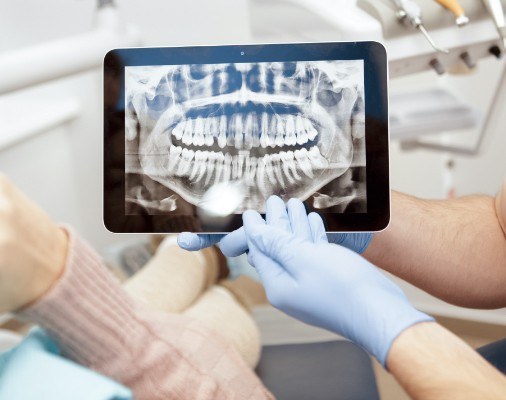Periodontal Disease Treatment – Mt. Holly, NJ
Supporting Good Gum Health
& Overall Wellness
According to the Centers for Disease Control and Prevention, an estimated one out of every two adults in the country are showing signs of gum disease, also sometimes referred to as periodontal disease. Even though this oral health problem is preventable, many patients struggle with it throughout their lives because they didn’t catch it early enough before it had the opportunity to cause permanent damage to their smile. We offer customized periodontal disease treatment in Mt. Holly, NJ to help minimize your symptoms and preserve the function and health of your grin.
Why Choose Mt. Holly Family Dentistry for Periodontal Disease Treatment?
- Dentists with Decades of Combined Experience
-
We Accept
Dental Insurance -
Serving Mt. Holly
Since the 1960s
Scaling & Root Planing

Scaling and root planing is a two-step process that involves one to two appointments with our team. First, we’ll thoroughly remove all plaque and tartar from the surface of your teeth, as far down as the pockets of your gums to prevent harmful oral bacteria accumulation. Then, we’ll smooth out the roots of your teeth to allow your gum tissue to healthily reattach and protect this vulnerable structure. With scaling and root planing, our goal is to stop the progression of gum disease and prevent permanent oral damage.
PerioChip Therapy

PerioChip is a unique and advanced therapy that we typically recommend in tandem with scaling and root planing. We’ll place a biodegradable chip that has 2.5 mg of Chlorhexidine Gluconate into your gums. It is a non-antibiotic treatment that slowly releases the Chlorhexidine to target the pockets of your gums over the course of 7 to 10 days and has been proven effective against a broad spectrum of harmful oral bacteria.
Halitosis Treatments

Millions of people experience chronic bad breath, also known as halitosis. In most cases, this is caused by poor oral hygiene that leaves food particles behind on teeth. As food and other debris breaks down in the mouth, it produces sulfur compounds that release a strong, foul odor. Think of the way food smells as it rots-- now imagine this in your mouth.
In less frequent cases, halitosis may occur due to chronic or systemic illnesses including:
- Infection
- Gum disease
- Diabetes
- Kidney or liver failure
- Chronic snoring or sleep apnea
Additionally, dry mouth may lead to chronic bad breath. Saliva neutralizes the acidic bacteria and keeps the mouth free from decay. Dry mouth leads to increased decay and possibly halitosis. Other conditions that may increase bad breath include aging, hormonal fluctuations, changes in diet, and stress.
No matter what the cause of your bad breath is, there are a number of at-home and in-office dental treatments we may recommend to improve your situation, including special prescription oral hygiene products. We may also suggest thoroughly cleaning your toothbrush and water flosser between uses to help minimize bacteria buildup on them. Call us today to find out how we can help you maintain a fresher smile!
Non-Surgical Periodontal Treatment
For those who have periodontal disease, after discussing the treatment options, our recommendation will always be the most conservative therapy that has the best chance of succeeding. If the problem is slight, the recommendation might be as simple as more frequent professional dental cleanings. If the problem is more established, we may recommend scaling and root planing, sometimes called deep cleaning. This involves a detailed removal of all hard deposits from the root surfaces of the teeth and disrupting and flushing away of the bacteria that grow under the gum line. There are many additional treatment options available, depending on the specifics of the individual situation.
Periodontal Charting & Diagnostics

This is a routine part of every examination. We continually monitor your mouth for any signs of periodontal disease, and we do a complete periodontal exam and charting on an annual basis. This is crucial for the health of your teeth and gums. Considering the growing evidence of the link between periodontal disease and heart disease, periodontal health can be a real lifesaver.
